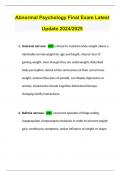Abnormal Psychology Final Exam Latest
Update 2024/2025
1. Anorexia nervosa - ANS -refusal to maintain body weight above a
minimally normal weight for age and height, intense fear of
gaining weight- even though they are underweight, disturbed
body perception, denial of the seriousness of their current low
weight, amenorrhea (loss of period), can display depression or
anxiety, treatments include cognitive-behavioral therapy,
changing family interactions,
2. Bulimia nervosa - ANS -recurrent episodes of binge eating,
inappropriate compensatory behavior in order to prevent weight
gain, continuous symptoms, undue influence of weight or shape
, on self-evaluation, binges frequently followed by vomiting,
treatments include food journals,
3. Multidimensional risk perspective - ANS -identifies serval kinds of
risk factors that combine to cause an eating disorder: perceptual
disturbances, ego deficiencies, ineffective parents, incorrect
interpretation of emotions, feel little control over lives, base
happiness off of weight, depression, genetics, low serotonin
activity
4. Weight set point - ANS -the weight level that a person is
predisposed to maintain, controlled in part by the hypothalamus
(part of the brain that regulates eating and hunger)
,5. Enmeshed family patterns - ANS -a family system in which
members are over-involved with each other's affairs and over
concerned about each other's welfare
6. Treatments for Eating Disorders - ANS -identifying negative
thoughts, food journals, antidepressant medications,
interpersonal psychotherapy, intravenous feedings, eating
monitored, teach self-control, change attitudes about eating and
weight, changing family interactions
7. Lateral hypothalamus - ANS -produces hunger when it is
activated.
8. Ventromedial hypothalamus - ANS -reduces hunger when it is
activated.
, 9. Depressants - ANS -substances that slow the activity of the
central nervous system. Reduce tension and inhibitions and may
interfere with a person's judgment, motor activity, and
concentration
10. Alcohol - ANS -any drink containing ethyl alcohol, five or
more drinks on a single occasion is considered binge drinking,
chemical is quickly absorbed into the blood through lining of
stomach and intestine,
11. Delirium tremens - ANS -a dramatic withdrawal reaction
experience by some people who are alcohol-dependent. Consists
of confusion, clouded consciousness, and terrifying visual
hallucinations.




